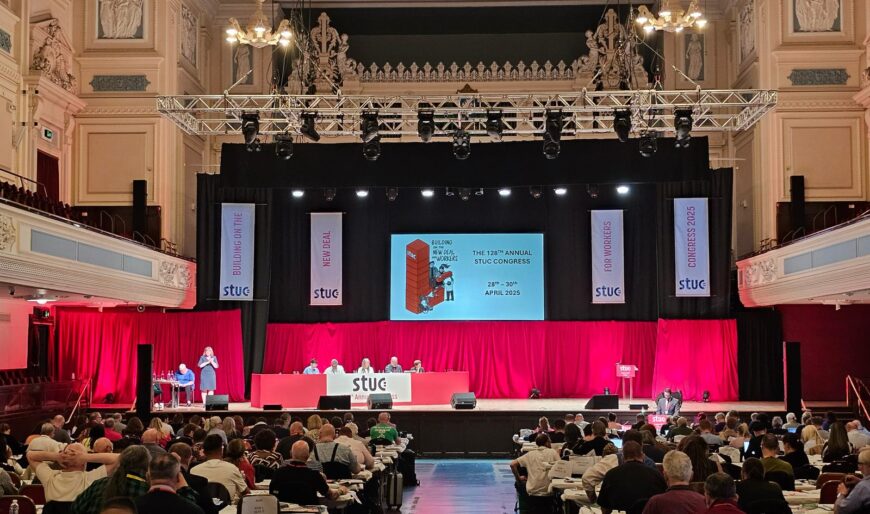STUC 25: Trade Unions Back Motion to Build on the New Deal and Counter Business Lobby Attacks on the ERB.
The Scottish Trades Union Congress (STUC) convened this week in Dundee

The IER joined the 2025 STUC Congress this year, hosting a fringe event with the Trade Union Co-Ordinating Group (TUCG) on the Employment Rights Bill, as well as engaging with Congress delegates on our expert analysis on the Bill and advocacy for policies that strengthen collective workers rights.
On Tuesday, delegates passed Composite Motion A: ‘Building on the New Deal’, which calls on Britain’s Labour Government to go further on sectoral collective bargaining and union recognition rights.
The motion welcomes aspects of the Bill that deliver day-one rights to SSP and protection from unfair dismissal, but pushes for a response to the business lobby’s attempts to water down measures.
The motion read:
“[…] Congress believes that the Government could and should go further in developing sectoral bargaining arrangements in key areas of the economy.
“Congress believes the collective rights of union access and recognition, offer the potential for union growth and renewal. However, achieving this potential will require processes that are workable, and which don’t give employers the ability to delay or prevent union access or recognition.
“It will also require a collective effort from the trade union movement to develop organising strategies for parts of the economy where unions are not recognised and where workers are unorganised.
“Congress further notes that this year marks the tenth anniversary of the Scottish Fair Work Framework. The world of work has undergone significant transformation since the Fair Work Convention began including:
- The UK’s departure from the EU;
- A new UK Government which has committed to a ‘New Deal for Working People’ ;
- The workplace changing with the rise of the gig economy, the adoption of automation, artificial intelligence and the impact of fifteen years of austerity; and
- The core budget for union learning not reflecting rising costs.
“Congress believes:
- just as trade unions renegotiate agreements with employers to reflect changing circumstances, fair work in Scotland must also evolve to meet these challenges; and
- trade unions are vital in ensuring Scotland remains a leader in promoting fair work and addressing the challenges of the modern workplace.
“Congress calls on the STUC General Council to:
- engage with the UK Parliament to ensure the Employment Rights Bill is as strong as it can be and recognises specific issues affecting Scotland;
- counter efforts from the business lobby to weaken the Employment Rights Bill;
- make sure that the UK Labour Government follows through in its promises to fully repeal the entirety of the Trade Union Act 2016, and repeal the Strikes Act 2023, as part of the Employment Rights Bill – including scrapping the Certification Office levy, scrapping the extended punitive powers of the Certification Officer, and banning complaints to the Certification Office by anti-union “third parties”;
- make sure that the UK Labour Government follows through in its promise to permit “modern and secure electronic balloting” for trade unions as soon as possible, for all elections and statutory strike ballots;
- demand an immediate intervention by the UK Labour Government to halt the Certification Office levy charges for 2024 – 2025, which are due on May 31st2025;
- remove the obligation on trade unions to re-run a ballot every six months;
- reverse the last government’s draconian increase to the maximum damages that may be awarded against trade unions;
- hold a one-day conference examining how to use the Employment Rights Bill to grow the trade union movement in Scotland, including considering how best to build on the Employment Rights Bill to ensure there is a commitment and timeline from the Scottish and UK Government to introduce mandatory sectoral bargaining agreements across the economy, underpinned by an agreed plan from affiliates as to how and where those agreements would apply;
- seek commitment from all political parties to support the devolution of employment law ahead of the 2026 elections;
- lobby the Scottish Government to:
-
- adequately address the challenges of the gig economy, automation and AI
- provide robust protections and workers’ rights in the context of these changes
- secure above inflation investment into union learning
- advocate for a renewed partnership between the Scottish Government, unions, and employers ensuring workplaces are fair, inclusive for the future; and?
- campaign for increased union involvement in policy making on issues such as automation, digitalisation, and AI, ensuring these areas benefit workers and do not undermine job security or conditions.”
You can read our briefing on the Employment Rights Bill – including what it sets out to achieve and areas of concern – here.







